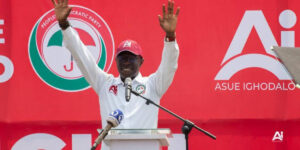By Usman Aliyu, News Agency of Nigeria (NAN)
As Nigeria approaches the 2027 General Elections, the recently concluded 2024 governorship election in Edo has emerged as a critical focal point for analysts and political observers.
The off-cycle poll not only served as a barometer for the political sentiments of the electorate but also highlights Nigeria’s position in her journey to a robust and flawless electoral system.
There were 17 candidates in the highly anticipated poll. However, three of them were frontline contestants in the race to the coveted seat at the Osadebey Avenue, Benin City.
Sen. Monday Okpebholo contested on the platform of the All Progressives Congress (APC); Asue Ighodalo, Peoples Democratic Party (PDP) while Olumide Akpata ran on the ticket of Labour Party.
Okpebholo is a serving senator National Assembly while Ighodalo is a lawyer and investment banker.
Akpata, meanwhile, a lawyer, is an erstwhile President, Nigerian Bar Association (NBA). Both Okpebholo and Ighodalo are from Edo Central, Akpata is hails from the South.
The election which held on September 21 witnessed heavy presence of security agents with over 41,000 personnel deployed only by the Police and the Nigeria Security and Civil Defence Corps (NSCDC) to maintain law and order.
The number excludes the personnel mobilised for the exercise by other sister agencies such as the military, whose presence was also felt in every nook and cranny of the state.
There was also the Federal Road Safety Corps, the Nigeria Immigration Service and the Nigeria Customs Service among others.
While some residents expressed concerns over the way the deployment triggered fear in parts of the state, obviously it ensures a peaceful voting process.
Voting went on smoothly in the state with no recorded case of the usual ballot box snatching, ballot stuffing or political violence.
Mr Sunday Igeh, is one of the electorate, who came out to vote as a result of the high presence of security agents.
“The presence of security made me come out as that showed that any violent activities by desperate politicians could be checked,” he told News Agency of Nigeria (NAN).
Similarly, the three frontline candidates demonstrated their desire for the peaceful atmosphere under which the voting was conducted.
With 291,667 votes Monday Okpebholo of APC was declared the winner by the Independent National Electoral Commission.
But amidst this declaration, concerns around collation of results and vote buying persisted, raising concerns about the integrity of the entire process.
Accredited observers, political analysts and the PDP feel the coalitions were conducted in an obscure way.
For instance, they fault the sudden switch in the collation centres for Oredo, Ikpoba Okha and Egor, without putting all the political parties on notice.

They are the three municipal local government areas in Edo South and with the highest voting population in the state.
In its accusation, the PDP alleged that even when the collation centres at those areas were shifted to the state INEC office, its party agents were denied access to the new venue.
Surprisingly, the Resident Electoral Commissioner, Dr Anugbum Onuoha, did not provide any clarification. Ever since then INEC has also offered no explanations on why the agents were denied access.
This led to accusations and counter-accusations between the APC and the PDP, which is the first runner-up in the election.
Raising the voice for the PDP, Rev. Olu Martins, Deputy Director-General, Asue-Ogie Governorship Campaign Council, said the party members were already celebrating their victory in before their mandate was allegedly stolen.
Martins during a news conference claimed that with the release of 95 per cent results by the INEC, the party was already coasting to victory with over 45, 000 votes.
“There was jubilation because by the time the result of the election got to 95 per cent, you will know whether you have won or not.
“But when we got to the collation centre, things changed as the police said they were on a mission and that whoever couldn’t stomach it should leave,” he alleged.
Conversely, the APC adjudged the whole process to be free, fair and credible.
Jarrett Tenebe, the chairman of the party in the state, argued that the results truly reflected the wish of the people.
Tenebe slammed PDP for crying foul when it knew the people of Edo would reject the maladministration that had engulfed the state during the last eight years of Obaseki.”
Corroborating the APC’s stance, Frank Mba, the Deputy Inspector-General of Police in-charge of Edo election, described the poll as a peaceful and successful exercise.
He said the police played a pivotal role in maintaining law and order and commended the people of the state for their exemplary conduct during the elections.
“The good people of Edo have conducted themselves commendably throughout the election process. We thank them for trusting and working with us,” the DIG says.
Mba also praises the officers and men of the Nigerian Police Force, members of the Armed Forces, and other law enforcement agencies for their professionalism and neutrality during the polls.
“Our personnel conducted themselves excellently well, maintaining political neutrality and complying with relevant laws and guidelines,” he said.
To ensure post-election safety, Mba said that the police activated strategies for high-visibility policing, confidence-building patrols, and protection of critical assets.
“We urge citizens to continue conducting themselves within the law, and we will ensure their safety,” he assured.
Shockingly, while inter-parties banter was ongoing, came damning reports about the integrity of the results.
Some 25 civil society organisations including Yiaga Africa, accredited by the INEC to monitor the important election, alleged that the results from several polling units were altered at collation centres.
These civil society organisations with different situation rooms in strategic areas of the state, say the conduct of the election lacked credibility.
Specifically, Yiaga Africa, which says it deployed the Process and Results Verification for Transparency (PRVT) methodology for the exercise, described the declared results as lacking integrity.
The PRVT methodology, it explains, involved 300 stationary and 25 roving observers, covering a representative sample of polling units (PUs) across all 18 local government areas of the state.
Yiaga Africa, renowned for observing elections in the country for past years, discredits the election on account of widespread irregularities that included alteration of results by the collation officers.
The CSOs called on the INEC to review the results based on what is uploaded on the INEC Result Viewing (IReV) portal, within the time stipulated by section 65 of the Electoral Act 2022.
Another reported dent on the election is the alleged cases of vote buying an enigma that raises heads during elections in Nigeria.
The case of Edo governorship election was not different. NAN reliably gathered that both the APC and the PDP used money to sway votes.
It was gathered that one of the parties doled out N10,000 per vote and the other making it N20,000. This brazen attempt to sway votes casts a dark shadow on the integrity of the process.
Political analysts say the Economic and Financial Crimes Commission has its work cut out in tackling this cancerous corruption that threatens the very foundations of our democracy.
They say it was high the anti-graft agency to switched gears and deployed intelligent gathering tactics to combat vote buying.
Storming polling units in commando-style is no longer effective, as politicians have caught wind of this strategy. Vote buying has become a major concern, with all major parties guilty of the electoral malpractice.
Elections are a delicate dance of multiple stages – accreditation, voting, collation of results and declaration of winners.
Each stage is crucial to the overall legitimacy of the process. Similarly, if any stage of the election process is faulty, the entire system is compromised.
Consequently, INEC needs to step up its game in collating election results to align with the Electoral Act guidelines.
Many observers say the Edo governorship election, in spite of being off-cycle and receiving global attention, observably, still fell short of expectations.
They urge INEC to regain the trust of Nigerian voters who by addressing the observed gaps in subsequent elections to pave the way for more credible performance in 2027 general polls. (NANFeatures)

